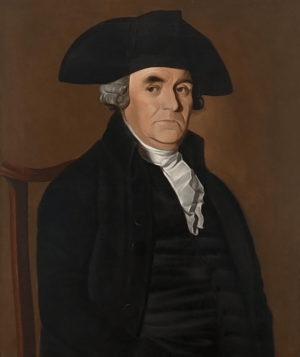Benjamin Simonds facts for kids
Quick facts for kids
Benjamin Simonds
|
|
|---|---|

Portrait of Benjamin Simonds by William Jennys
|
|
| Born | 23 February 1726 Killingly, Connecticut Colony, British America |
| Died | 11 April 1807 (aged 81) |
| Rank | Colonel |
| Commands held | 2nd Berkshire County Regiment |
| Battles/wars | |
Benjamin Simonds (born February 12, 1726 – died April 11, 1807) was an important military leader from Massachusetts. He served during two big conflicts: the French and Indian War and the American Revolutionary War. During the Revolutionary War, he was a Colonel in charge of a group of about 500 men. This group was known as the "Berkshire Boys." His regiment, the 2nd Berkshire County Regiment, was famous for fighting bravely in the Battle of Bennington in 1777.
Contents
Early Life and Family
Benjamin Simonds was born on February 12, 1726, in Killingly, which was then part of the Connecticut Colony. This area was also part of British America. His parents were Joseph and Rachel Simonds. Benjamin was baptized at the First Congregational Church of Killingly in March 1726.
His father, Joseph Simonds, was a cordwainer (someone who makes shoes). Joseph moved around a bit, first settling in Londonderry and then in Killingly. Benjamin's mother, Rachel, passed away around 1728. His father later remarried twice. Around 1741, Joseph moved his family to Ware, Massachusetts.
Early Military Adventures
Benjamin Simonds started his military career in 1744 during King George's War. At the beginning of this war, the governor ordered forts to be built. One of the strongest forts was Fort Massachusetts. Benjamin Simonds was part of the soldiers stationed there in 1745.
On August 19, 1746, French soldiers and their Native American allies attacked Fort Massachusetts. The fort surrendered the next day. Benjamin Simonds and the other soldiers were taken captive. They were marched to Fort Saint-Frédéric and then to Montreal. Finally, they reached Quebec in September 1746.
The fort's chaplain, Rev. John Norris, wrote about their difficult journey. He mentioned Benjamin Simonds, calling him "Brother Simon." Norris wrote that Native Americans carried "Brother Simon" in their canoes. He also noted that the French found horses for "Brothers Simon and John Aldrich" to ride.
Benjamin Simonds was held in a prison in Quebec. Only nine of the captured soldiers from Fort Massachusetts returned home. Benjamin Simonds and John Aldrich were the last to return in October 1747. They were both sick in the hospital. After he returned, Benjamin Simonds was very weak for a month. He later received money for his service.
During the Seven Years' War, Benjamin Simonds served again at Fort Massachusetts. He was a private in different companies from 1754 to 1755.
Leading in the Revolutionary War
Benjamin Simonds is best known for his important role in the American Revolutionary War. On August 30, 1775, he became a Colonel. He led the 2nd Berkshire County Regiment of the Massachusetts Militia.
Colonel Simonds and his regiment fought in the Battle of White Plains on October 28, 1776. After that, his regiment was stationed at Fort Ticonderoga for several months.
A very important moment for him was before the Battle of Bennington. On August 13, 1777, he met with General John Stark and Colonel Seth Warner. They held a meeting to plan their strategy. Colonel Simonds then led his Berkshire regiment bravely in the Battle of Bennington. He continued to serve as a Colonel until 1780.
Family Life
On April 23, 1752, Benjamin Simonds married Mary Davis in Northampton, Massachusetts. Mary was born in Brookfield, Massachusetts, in 1730. Benjamin and Mary had ten children together. All of their children were born in Williamstown, Massachusetts.
Their children were:
- Rachel Simonds (1753 – 1802)
- Justin Simonds (born 1755, died young)
- Sarah Simonds (born 1757)
- Marcy Simonds (1759 – 1834)
- Joseph Simonds (1762 – 1838)
- Prudence Simonds (1763 – 1844)
- Ablina Simonds (1765 – 1846)
- Electa Simonds (1767 – 1841)
- Polly Simonds (born 1771)
- Benjamin Simonds (1773 – 1786)
Mary Simonds passed away on June 7, 1798. Benjamin Simonds then married Anna Collins on November 4, 1798.
Later Years and Legacy
In his later years, Benjamin Simonds was asked to join a committee. This committee was in charge of building "West College." This college was part of Colonel Ephraim Williams' will. The building was finished in 1791 and was first called the "Free School." In 1793, it officially became Williams College.
Benjamin Simonds died in 1807. He was buried in what is now called Westview Cemetery in Williamstown, Massachusetts.
Images for kids
-
Benjamin Simonds gravesite. From left to right, (small stone) Benjamin Simonds (13-year-old son), Simonds first wife, Mary, mother to all of his ten children. Next is Benjamin Simonds, and far right is Ana Simonds, his second wife. Simonds inscription reads, "This monument erected in memory of Col. Benjamin Simonds, one of the first settlers in Williamstown, and a firm supporter of his country's Independence. He was born Feb. 23, 1726, and died April 11, 1807."
 | William L. Dawson |
 | W. E. B. Du Bois |
 | Harry Belafonte |


